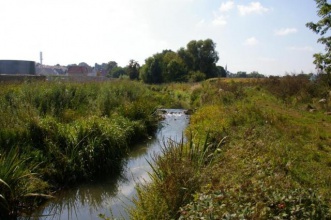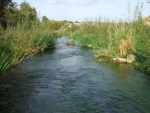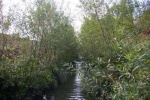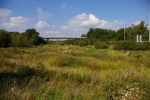Case study:Restoration of the original riverbed of the Steinbaechlein
This case study is pending approval by a RiverWiki administrator.
Project overview
| Status | Complete |
|---|---|
| Project web site | |
| Themes | Economic aspects, Water quality, Urban |
| Country | France |
| Main contact forename | Onema |
| Main contact surname | (Office national de l’eau et des milieux aquatiques) |
| Main contact user ID | |
| Contact organisation | Onema |
| Contact organisation web site | http://www.onema.fr/ |
| Partner organisations | |
| Parent multi-site project | |
| This is a parent project encompassing the following projects |
No |
Project summary
The Steinbaechlein is a 14.5 kilometers long secondary arm of the Doller, the latter having a mainly agricultural 215 km2 wide watershed.
In the XIX century, a 400 long meander of the Steinbaechlein was cut in order to provide water to a chemical factory.
Following the dismantling of the factory and in the framework of a new business and residential development, the river was returned to its old bed. The work was motivated by the need to increase the available surface for a commercial building and the will to get the river away from polluted soil.
The new bed was excavated in the wasteland that had developed in place of the former course of the river. Diversified cross sections and widths were established and the profile was fixed by two sills; helophytes were planted in the banks and in the riverbed along almost all the restored stretch. On the left side of the river a wetland was created, to be used as flood retention area.
Monitoring surveys and results
No pre-project assessment was carried out. In 2007, electrofishing was conducted by the National Office for Water and Aquatic Environments (ONEMA), showing a good recolonization of the restored stretch by fish; juveniles of trout, target species in the river, were also found. Since then no other monitoring has been done or is foreseen.
Lessons learnt
Image gallery
|
Catchment and subcatchmentSelect a catchment/subcatchment
Catchment
Subcatchment
Site
Project background
Cost for project phases
Reasons for river restoration
Measures
MonitoringHydromorphological quality elements
Biological quality elements
Physico-chemical quality elements
Any other monitoring, e.g. social, economic
Monitoring documents
Additional documents and videos
Additional links and references
Supplementary InformationEdit Supplementary Information
| ||||||||||||||||||||||||||||||||||||||||||||||||||||||||||||||||||||||||||||||||||||||||||||||||||||||||||||||||||||||||||||||||||||||||||||||||||||||||||||||||||||||||||||||||||||||||||||||||||||||||





